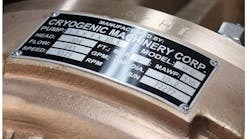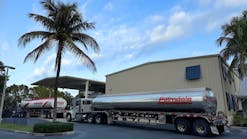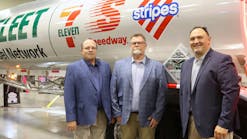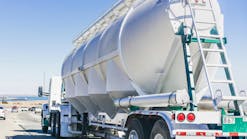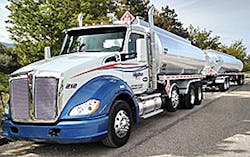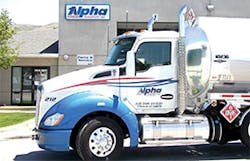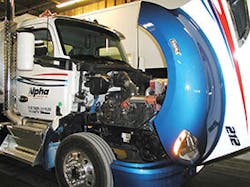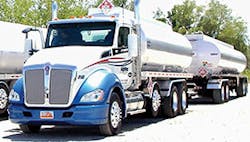TO MEET the needs of a growing western market, Alpha Transport Inc runs one of the most efficient petroleum fleets in the region. Tractors and trailers are specified for maximum productivity.
The Salt Lake City, Utah-based is in the midst of a project to replace most—if not all—of its 52 trucks and tractors. In addition to being spec’d for fuel economy, the new power units can handle gross combination weights up to 129,000 pounds.
“We’re making some serious changes in our truck fleet,” says Adam Lindsay, Alpha Transport vice-president. “We’re doing this to help ensure that we can continue to provide our customers with the great service they have come to expect.
“I haven’t been this excited about truck specs in a long time. Our newest spec saves weight, provides nearly a 20% boost in fuel economy in our tanker fleet and a 15% bump in our freight fleet, and has our drivers raving about the comfort. We drive 4.2 million miles per year, and each 5% percent jump in fuel economy gives us a 1% gain to our bottom line, so you can see why I’m so excited.”
Lindsay, whose father-in-law (Jack White) is a co-owner in the business, started with the company as a driver and has worked in dispatch and management. “I got the full scope of every piece of the business,” he says. “We’ve made a progressive shift to be more efficient. You have to these days to stay competitive. We were big fans of the long-nose traditional Kenworth W900, but moved to the T660 and now the T680.”
Diverse operation
Of the 52 trucks in the Alpha Transport 40 are dedicated to fuel hauling and the remainder are in general freight and flatbed operations. The carrier serves customers throughout the western states.
Alpha Transport specializes in servicing a customer base that includes distribution of bulk petroleum products such as gasoline, distillates, light motor oils, and aviation products. In 2003 Alpha Transport diversified its fleet and created a new division called Alpha Express. Alpha Express is a truckload fleet that delivers general commodities such as paper goods, plastics, and chemicals to the 24 Western States with the ability to service all 48 states in the continental United States.
Established in 1953 as Johnson Oil Company before becoming Alpha Transport in 1990, the carrier focused its attention on Utah for many years. That has now changed, and the company is in the midst of a growth spurt that shows no sign of slowing.
“Utah had been our main area of business but six years ago we went outside our comfort zone and opened a location in Idaho hauling jet fuel,” Lindsay says. “That was a great decision and opened up new territory and customers for us. We haven’t looked back and we are moving into other markets.
“We’re in the process of adding a terminal in Las Vegas (Nevada). We have two petroleum transport units based there now, and we’ll add another in early 2015. We’ll be setting up a location in Portland (Oregon) before the end of this year, and we see additional growth opportunities in Arizona.”
To manage the expanding operations, company dispatchers use TMW software. Communication with drivers is handled through PeopleNet on-board computers in the trucks.
Trip length
Trips average 45-50 miles for the fleet, but some hauls are up to 500 miles. On the shorter hauls, drivers can manage four to five loads per shift.
“Aviation fuel accounts for many of our longer hauls to Washington, Oregon, and northern California,” Lindsay says. “Our fuel shipments to customers in Utah and Idaho generally come out of the refineries in Salt Lake City.”
The carrier slipseats its trucks and tractors, with two drivers per unit. “We want maximum utilization from our equipment.”
Getting enough drivers has been a bit of a struggle for the past 12 to 18 months, but the carrier saw some improvement over the summer. “The oilfield still attracts quite a few drivers,” Lindsay says. “However, we did some driver pay adjustments at the beginning of this year to make our company more attractive. The new trucks also are helping.”
New trucks
Earlier this year, Alpha Transport took delivery of its initial five Kenworth T680s. Three T680 daycab fuel haulers were specified with the PACCAR MX-13 engine rated at 500 horsepower and 1,850 lb-ft of torque, and two T680 76-inch sleepers use the MX-13 engine rated at 455 horsepower and 1,650 lb-ft of torque.
The T680s also were specified with Eaton’s UltraShift PLUS 13-speed transmission. “We’re getting away from manual transmissions,” Lindsay says. “I don’t think we will ever go back to them. Drivers like the automated transmissions because they can focus more on driving.”
Driver comfort certainly played a role in the selection to the carrier’s new Kenworth T680s. Paying attention to driver preferences has helped Alpha Transport maintain an enviable 15% driver turnover rate.
“The drivers really appreciate the T680’s comfort and wide cab,” Lindsay says. “The roomy space between the seats gives them great access to the sleeper. They like to use the swivel passenger seat to face the sleeper and the rotating fold-out table while the truck is parked.”
Impressive performance
The results from the first five T680s were so impressive that the company decided to standardize on the T680 and 500-hp PACCAR MX-13 engine as trucks come due for replacement on their scheduled trade cycle. The T680s were purchased through Kenworth Sales Company in Salt Lake City.
“Six more T680s with the 500-hp PACCAR MX-13 will come in soon, and we’re getting quotes for five more,” Lindsay says. “But we might reevaluate that cycle and liquidate our older fleet trucks faster—the fuel economy numbers could be too big to ignore.”
According to Lindsay, prior to the T680, the best a truck in his tanker fleet had ever gotten was 4.7 mpg. “With the heavy loads we’re pulling and the mountainous terrain, and then in-city driving, we didn’t think we could do much better,” he says. “But the combination of the Kenworth T680 and the PACCAR MX-13 has already raised that to 5.5 mpg, and the trucks aren’t even broken in yet. That’s why we’re so excited.”
For its general freight and flatbed operation, Lindsay says Alpha Transport is getting up to eight miles per gallon with its T680 76-inch sleepers “That’s an improvement of about one mile per gallon over our other tractors,” he says.
Heavy weights
Hauling 110,000 pounds GCW (gross combination weight) for a typical fuel delivery, Alpha Transport’s T680 daycabs with 249-inch wheelbase include a truck-mounted cargo tank that typically carries 5,200 gallons, while also pulling a tank trailer normally filled with 6,800 gallons of fuel.
“We needed extra power for these weights, so that’s why we chose the PACCAR MX-13 with 500 horsepower and 1,850 lb-ft of torque,” Lindsay says. “That engine is replacing the 475-hp and 485-hp 15-liter engines we were running. The 500-hp PACCAR MX-13 engine has been great in pulling the heavy loads and we’ve been very happy. The drivers like that the engine is very quiet as well.
“Being also able to lighten up by up to 2,000 pounds, compared to our W900s, is a big benefit as well,” he continued. “We can haul more fuel, and then when we do return empty, that weight savings gives us better fuel economy.”
Among the biggest weight-savings contributors with the T680s are the PACCAR MX-13 (over a 15-liter engine), Kenworth AG400 suspension, and dropping from two fuel tanks to one for tank and fuel weight reductions. The carrier also specifies the Bendix stability system and air disc brakes.
Petroleum tanks
Alpha Transport runs truck-and-trailer units, semi-trailers, and Rocky Mountain doubles-style A-trains. Petroleum truck tanks and trailers are supplied by Beall, Mac Trailer, Heil Trailer International, and Polar Tank Trailer.
Semi-trailers have three to four compartments, truck-mounted tanks have two compartments, and pull trailers three compartments. Tank hardware includes Betts domelids, Dixon Bayco API adapters, and FloTech overfill protection.
Tank trailer running gear includes Hendrickson Intraax suspensions, Hendrickson Tiremaax tire inflation systems, and Meritor WABCO roll stability. ♦



